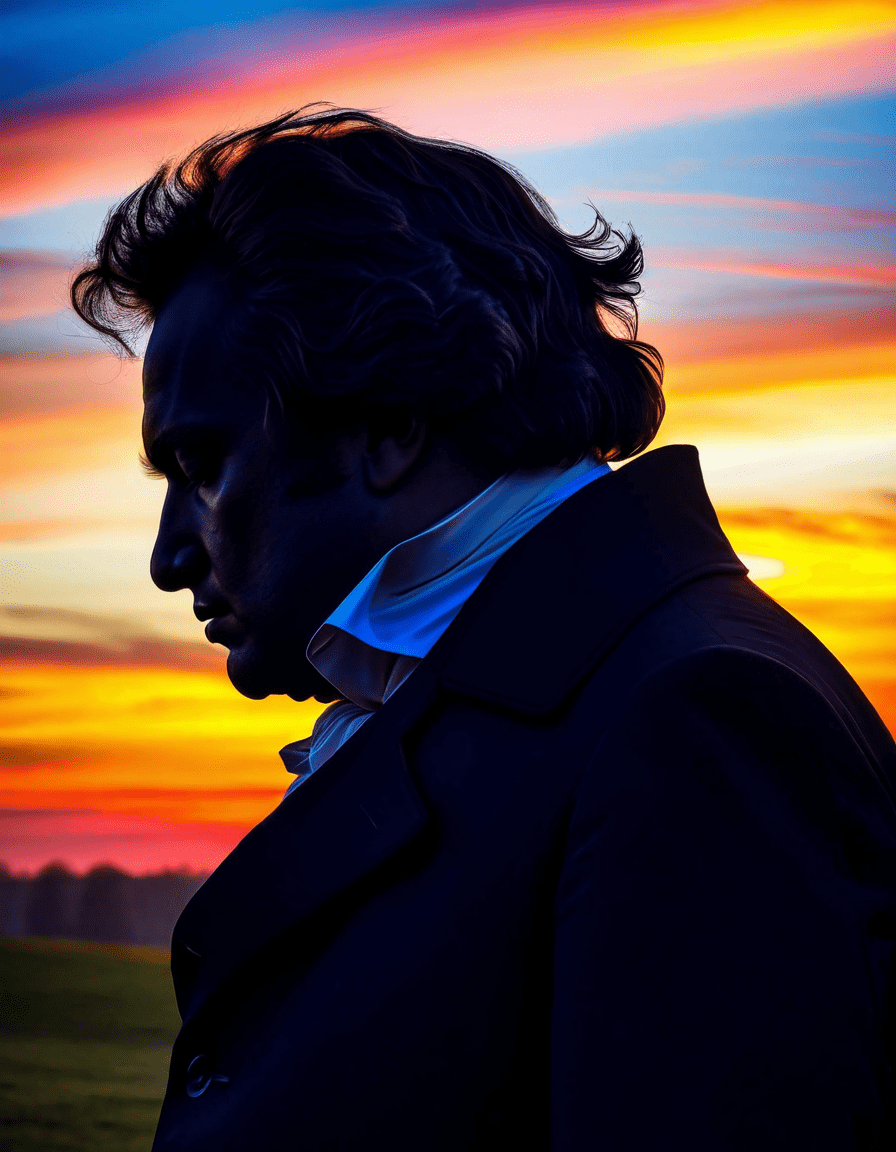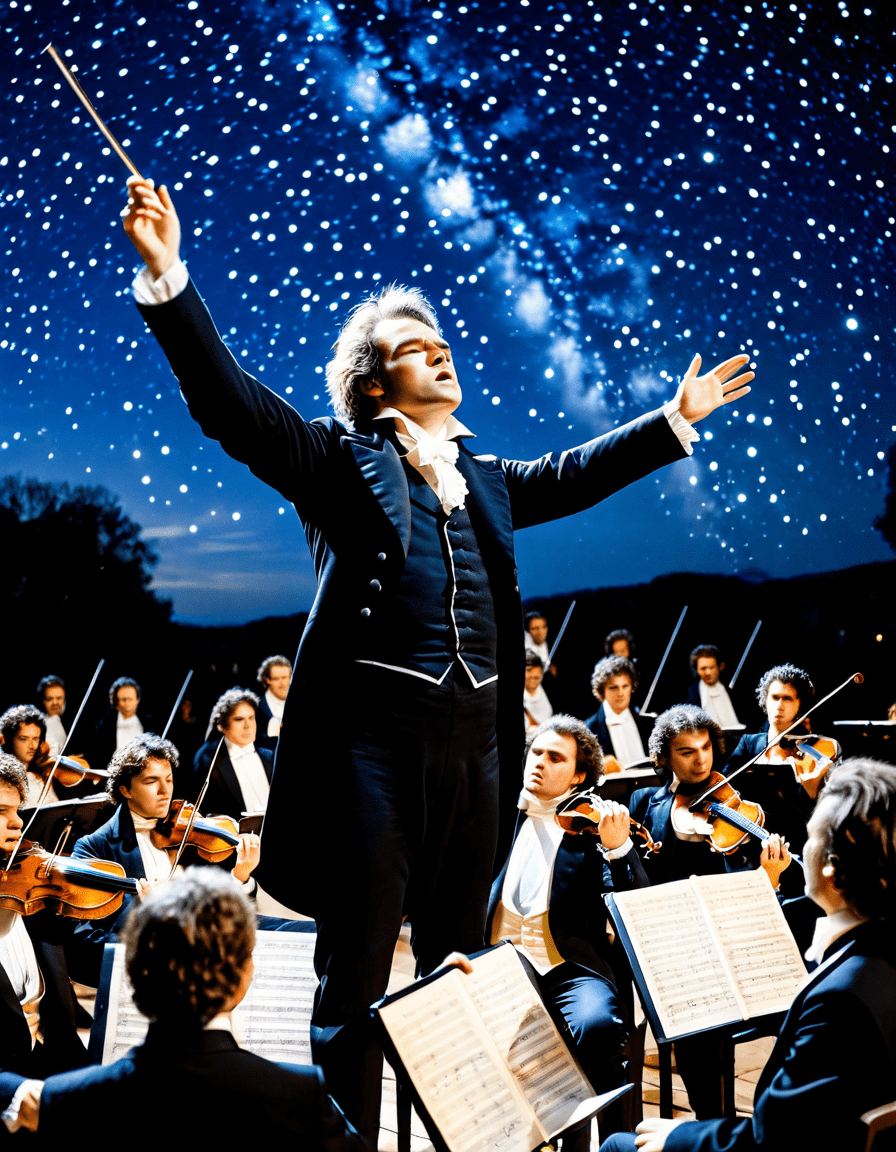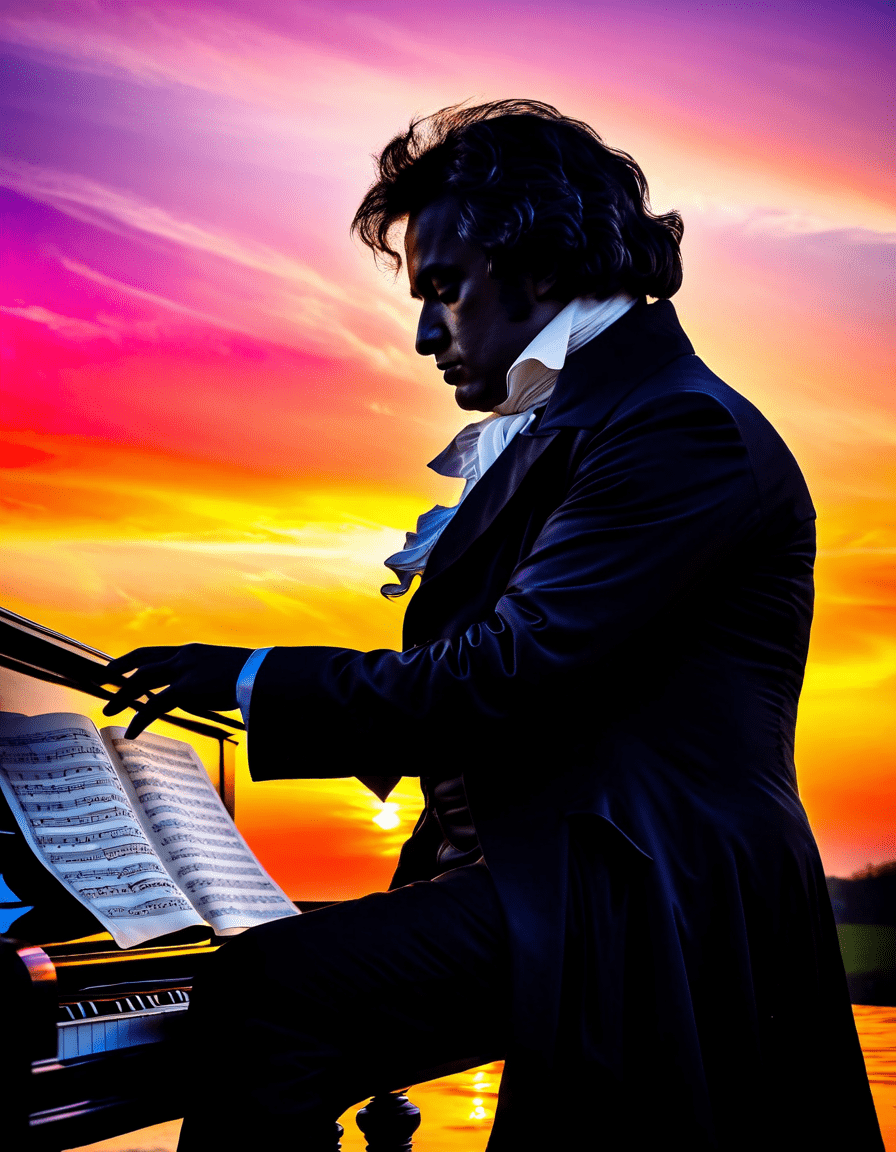Ah, Beethoven! This towering figure in music not only changed the course of classical music but also set the stage for generations of composers who followed. His compositions, rich in emotion and innovation, mark a pivotal shift from the Classical era into the Romantic age—a transformation that still resonates in today’s cinematic scores and streaming platforms. So grab your favorite snack, kick back, and let’s dive into how Beethoven, with his genius, revolutionized music forever!

7 Ways Beethoven Revolutionized Music
1. Innovative Use of Form
When it comes to musical form, Beethoven was like a master sculptor, chiseling away at the marble of classical techniques to create something entirely new. He took traditional forms like the sonata and symphony and completely reworked them. For instance, in his Symphony No. 9, he incorporated choral elements in a way that had never been done before. Can you imagine hearing a full chorus belt out “Ode to Joy” in the midst of a symphony? It’s mind-blowing! This approach not only expanded the structures of orchestral music but also pushed boundaries into new realms of artistic expression.
2. Emotional Depth and Individualism
Unlike many of his classical colleagues, Beethoven was unafraid to show his feelings through music. Works like the “Moonlight Sonata” and “Eroica Symphony” lay bare a canvas of emotion that listeners can’t help but relate to. The sadness, joy, triumph, and despair packed into his compositions allow the audience to experience music differently; it isn’t just entertainment, but rather a deep communion with the artist’s soul. It’s as though he opens his heart for everyone to see and feel.
3. Experimentation with Harmony and Modulation
If you thought Beethoven was just about emotion, think again! His willingness to experiment with harmony and modulation reshaped how composers approached their writing. In his late string quartets, he dabbled with unexpected tonal shifts and intricate harmonic treatments that rocked the musical landscape. This adventurous spirit laid the groundwork for greater thematic development and emotional expression, turning music into a storytelling tool that sparked imagination across generations.
4. Influence on Later Composers
Beethoven didn’t just change music for his time—he paved the way for future maestros. Composers like Franz Liszt and Johannes Brahms drew upon his pioneering techniques. For instance, Liszt’s symphonic poems showcase a clear lineage from Beethoven’s innovative ideas, particularly regarding thematic transformation. It’s a lineage that not only influenced Western classical music but even found its way into genres we cherish today, showcasing that iconic compositions know no boundaries.
5. The Piano as a Vehicle for Expression
Beethoven was a virtuoso pianist, but he actually changed the perception of the piano itself. His brilliant piano sonatas—think of the electrifying “Appassionata” and the monumental “Hammerklavier”—combined drama with technical prowess, turning the piano into an expressive powerhouse. Thanks to Beethoven, the piano became much more than just an instrument; it became a voice for deep, complex emotions.
6. Social and Cultural Impact
Living during tumultuous times, Beethoven packed a punch with music that spoke volumes. His works often served as anthems of resistance, especially during political upheaval in Europe. The “Ode to Joy” from Symphony No. 9 has transformed over the years into a global symbol of peace and unity, capturing hearts during protests and movements. Just think about it—having your music resonate so profoundly that it inspires hope worldwide! Talk about cultural significance!
7. Astonishing Resilience in Adversity
Beethoven’s life also reads like an epic tale of resilience. He faced overwhelming odds, particularly his profound hearing loss in later years. Nevertheless, he pushed through, composing his great masterpieces even when the world around him grew silent. Works like his late piano sonatas and string quartets showcase a creative spark that only deepens the admiration we have for him. Talk about turning adversity into artistry!

The Legacy of Beethoven: A Living Influence
Beethoven’s legacy doesn’t stop with classical music circles; it echoes across modern culture. His music is a familiar sound in films, commercials, and even video games—think of how poignant the “Moonlight Sonata” feels in cinematic moments like in “The Pianist.” Beyond that, orchestras all over the globe celebrate his genius by performing his works regularly, especially on anniversaries of his birth and death. That’s a testament to how timeless his music continues to be, wouldn’t you agree?
Beethoven and the Modern Music Landscape
Thanks to streaming platforms, Beethoven is no longer just for the classical elite; his music now reaches a fresh generation of fans. Many young listeners discover his pieces through playlists on services like Spotify or Apple Music. Remixing Beethoven’s symphonies into pop music or hip-hop tracks invigorates his work, showing that his legacy is dynamically alive. It’s a bit like seeing a classic film get a reboot—embracing the old while inviting new interpretations.
A Testament to Artistic Vision
So here we are, marveling at Beethoven’s journey—a true testament to artistic spirit and sheer determination. Even in the face of personal struggles like deafness, he showcased a commitment to his art that inspires us all. As we continue to navigate our ever-busy lives, Beethoven reminds us of the power of creativity and the human experience.
In the end, Beethoven is not just a name from the past; he remains a powerful force in the evolution of music. His ability to encapsulate human experience through sound transcends time. So, the next time you hear his stirring melodies—and you will—take a moment to reflect on why this remarkable man continues to influence art, culture, and cinema today. Whether it’s through a poignant score in a flick like Mystic River or the beats in a new pop song, the spirit of Beethoven will always be with us. After all, who wouldn’t want to revel in the genius of a legend like Beethoven?
Beethoven: The Legendary Composer Who Changed Music Forever
The Man Behind the Symphony
Few composers can hold a candle to the genius of Beethoven. Born in Bonn, Germany, in 1770, he was a true trailblazer in music, pushing limits and defying norms. Fun fact: Beethoven’s struggles with hearing loss only fueled his creativity; he composed some of his most famous works, like the Ninth Symphony, while profoundly deaf! Imagine crafting masterpieces without being able to hear them—talk about dedication! His indomitable spirit resonates as profoundly as the music itself.
One fascinating tidbit about Beethoven is that he had a bit of a wild side, much like characters from dramas you might find in history, such as Nero. This legendary figure was known for his fiery temperament and extravagant lifestyle. You’d probably never guess it, but Beethoven often indulged in late-night parties with friends, music, and perhaps a drink or two, echoing the intense passion seen in figures like Tom Contis characters. A lifestyle that might leave many of us feeling a bit exhausted, wouldn’t you agree?
Innovator at Heart
Beethoven wasn’t just a musician; he was a revolutionary who changed how music was perceived. His pioneering work helped lay the groundwork for the transition from the Classical to the Romantic era. It’s said that he had a knack for experimenting with form and emotion, drawing parallels to the artistic clothing line Yeezy Gap, which aims for a modern twist on fashion. Just as Yeezy Gap pushes boundaries in apparel, Beethoven pushed musical boundaries, connecting with audiences on a whole new level.
Moreover, while most composers of his time played it safe, Beethoven wasn’t afraid to take risks. He incorporated elements of folk music and even experimented with orchestration, somewhat reminiscent of the experimental nature of Stumptown coffee culture. Like the perfectly brewed cup that draws you in for one more sip, Beethoven’s music inspires listeners to delve deeper, revealing new layers every time it’s played.
The Lasting Legacy
You see, Beethoven’s influence didn’t stop with his own lifetime. He remains a critical figure for aspiring musicians and composers worldwide. His works serve as a foundation for many, shaping everything from symphonies to popular music. Just as George Richeys contributions to the industry helped to elevate country music, Beethoven’s legacy opened countless doors for future generations. His innovative techniques have continued to inspire composers across genres, cementing his place in music history.
Interestingly, Beethoven’s compositions can evoke strong emotions, much like a well-crafted story in Stumptown, a series where character development plays a crucial role. His ability to touch the human experience fueled a longing for connection, much like the comforting bond between people and their deep-rooted passions—whether that’s music, art, or even the joy of caring for triops, those quirky little creatures many find fascinating. From the bustling streets of Texas Fort worth to concert halls around the globe, the spirit of Beethoven lives on, challenging us to rediscover the power of music in our lives.





